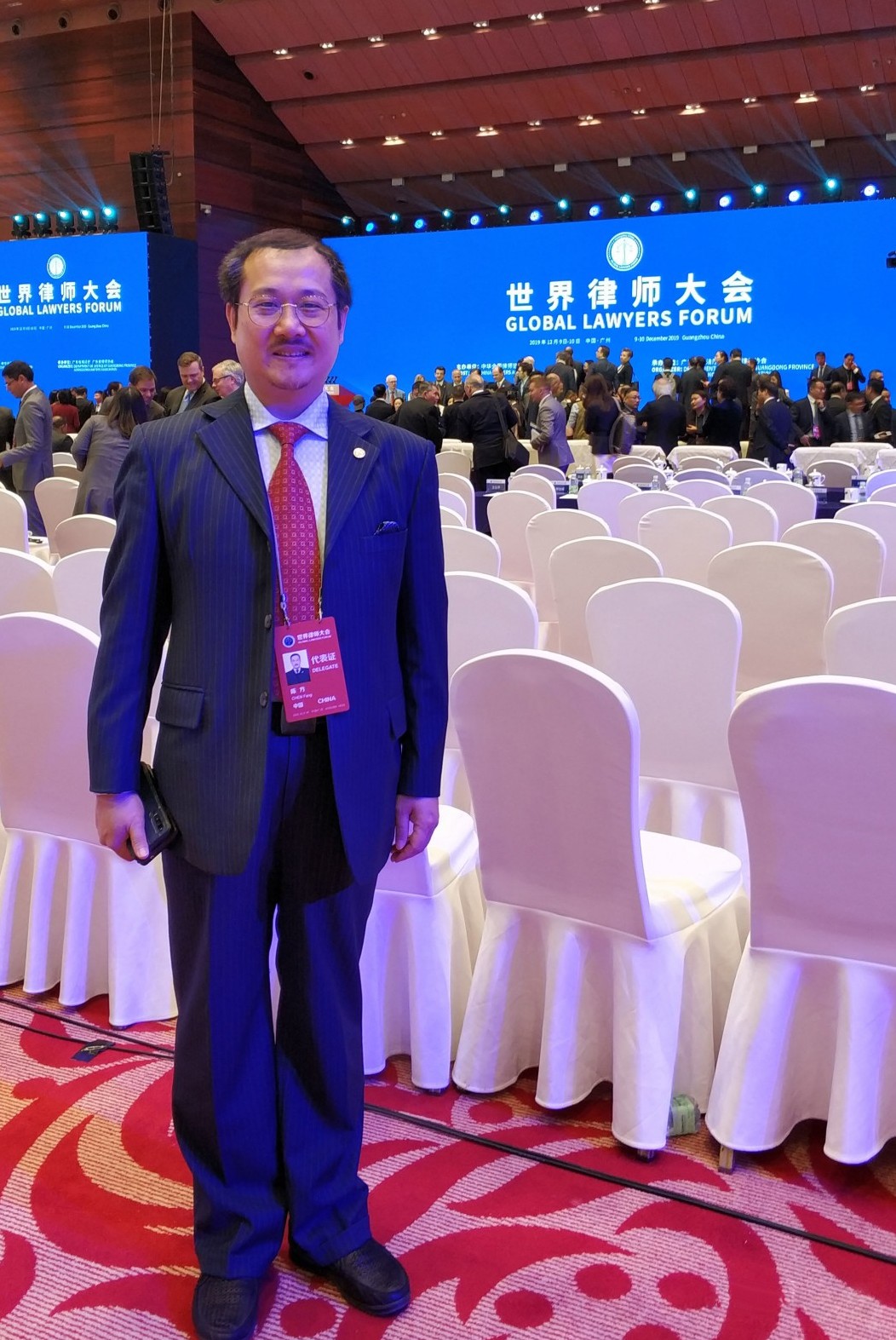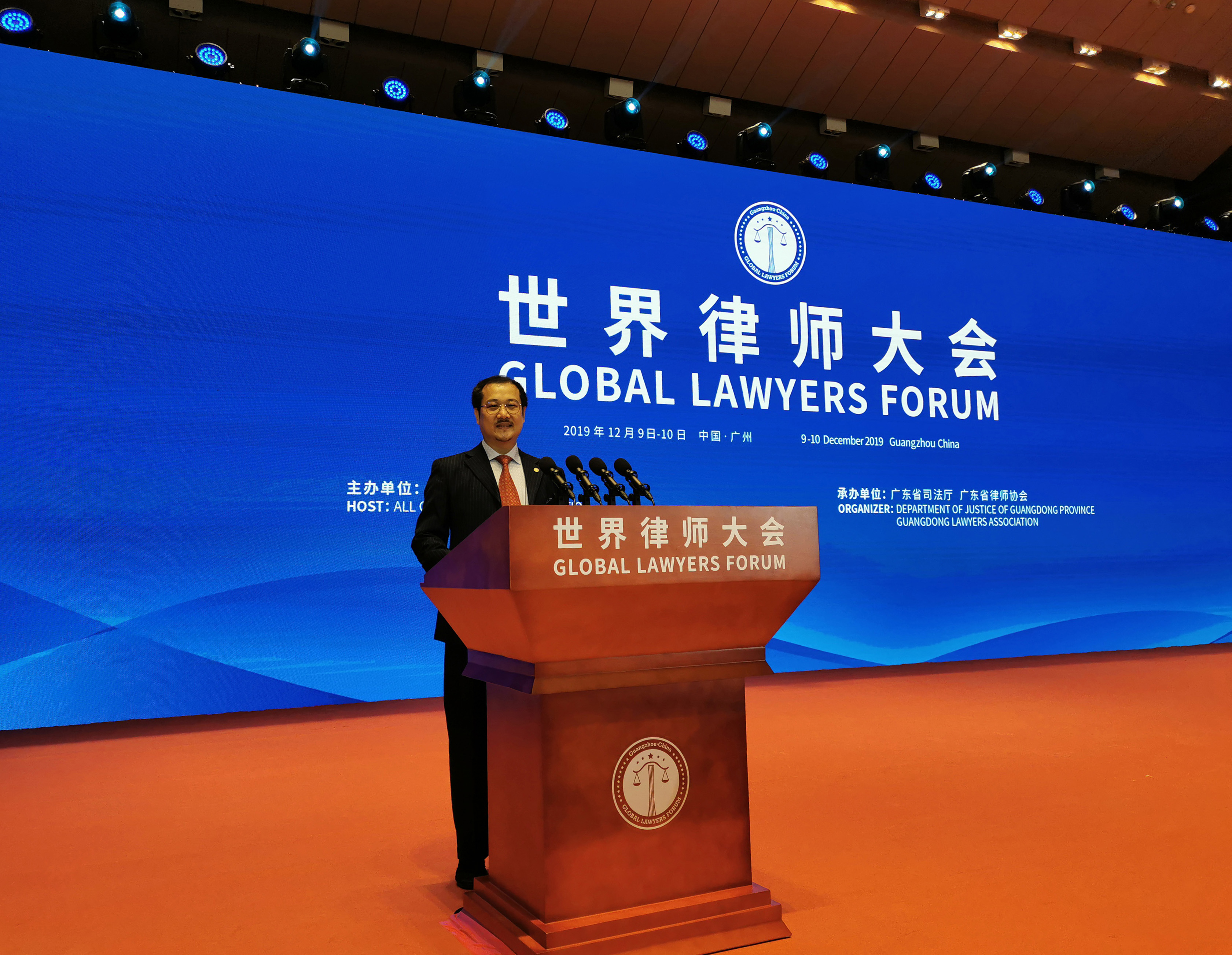12月9日,世界律師大會在廣州盛大開幕,廣東省律協副會長、深圳市律師行業黨委委員、前海國合法律研究院常務副理事長、廣東星辰(前海)律師事務所主任陳方受邀出席,並在世界律師大會分論壇上針對人工智能應用中可能出現的法律問題進行了分享。

陳方律師出席世界律師大會

陳方律師在世界律師大會分論壇上針對人工智能應用中可能出現的法律問題進行了分享
下面分享陳方律師在世界律師大會上的發言
人工智能應用的法律問題
Legal Issues on AI Application
謝謝主持人。各位嘉賓,歡迎來到世界律師大會。我謹代表廣東省律師協會,熱烈歡迎大家。
Honorable guests, ladies and gentlemen. Welcome to 2019 Global Lawyers Forum. On behalf of Guangdong Lawyers Association, may I extend our warmest welcome to all of you for joining in this activity.
人工智能旨在創建智能機器。自人工智能誕生以來,就引發了許多爭議。人工智能現已成為科技行業的重要組成部分。然而,應用人工智能可能面臨法律風險。今天,我將會介紹無人駕駛汽車,社交媒體和線上銷售行業在應用人工智能時可能面臨的法律風險。
Artificial intelligence aims to create intelligent machines. AI has created many controversies since it comes out, and now it become much more essential. However, applying AI may face some legal risks. Today, I would like to introduce the legal risks that driverless car, social media and online sales industries may face while applying AI.
一、無人駕駛汽車
無人駕駛技術是新一代信息技術深度融合的產物。在商用領域,諸如物流配送、危險作業、共享出行和農業機械這些領域,在自動駕駛正式民用前,商用領域自動駕駛的快速發展帶動民用自動駕駛更快鋪展。
Driverless technology has been widely used in commercial sectors, such as logistics and distribution, hazardous operations, shared travel and agricultural machinery. The rapid development of driverless tech in commercial use promotes its civil use.
無人駕駛帶來兩個法律問題。第一個問題是,司機的不存在給中國現行的駕駛證制度帶來挑戰。第二個問題是,交通事故發生後,通過現行的民事和刑事法律制度,難以確定責任方。
The practical application of driverless driving brings two legal problems. The first problem is, the absence of drivers brings greater challenges to the current Chinese driver’s license rules. Second, when traffic accidents happen, it’s hard to determine the responsible party of driverless driving through the current civil and criminal system.
無人駕駛與現行刑法的衝突來自以下三個方面。首先,行為主體的不確定性。其次,駕駛員和乘客的行為與事故之間難以成立因果聯繫。再次,承擔的法律責任與傳統的交通事故犯罪不同,因為無人駕駛車既不控制行為,又無主觀過錯,倘若由相關主體承擔刑事責任,這背離了我們法律的精神與本質。
The conflict between driverless driving and the current criminal law comes from the following 3 parts. The first is the uncertainty of the behavioral subject. Secondly, it is hard to establish the causality between the driver’s or the passenger ‘s behavior and the accident. Thirdly, the assumed legal liabilities differ from that in traditional traffic-accident-crime, because driverless cars has neither control behavior nor subjective fault. Relevant subjects’ bearing criminal liability deviates from the spirit of current law system.
現時,部分國內立法規定測試單位必須購買交通事故責任保險,如果測試車輛在測試期間發生事故,按照現行道路交通安全法及相關規定進行處理,並由測試駕駛員承擔相關法律責任。一些域外立法有一定參考意義。因此,我們提出建議如下:第一,設立專門監管機構,專設監管機構以協調各監管部門的工作。第二,在責任承擔方面,應當以過錯責任為原則,現階段若對測試單位有分配責任過高,不利於無人駕駛汽車行業的發展。第三,在賠償責任上,應當引入市場力量分擔,如將駭客攻擊等導致意外事故納入保險範圍,有助降低企業顧慮。
Currently, some Chinese domestic legislation stipulates that, test units must purchase traffic accident liability insurance. If the test vehicle causes any accident during the test, it shall be handled according to the current road traffic safety law and regulations. The test driver shall bear some relevant legal liabilities. Some legislation in other countries are instructive. So, we make the following advice: Firstly, set up a special regulatory authority to coordinate various regulatory authorities’ work. Secondly, fault liability principle shall be applied. For test units, unduly heavy responsibility is bad for developing driverless car. Thirdly, market forces should be introduced on liability distribution. For example, accidents caused by hacking attacks and system failure being included insurance coverage can reduce corporate worries.
二、社交媒體
當前,幾乎人人離不開社交媒體,人工智能在社交媒體上的應用相當廣泛。
At present, almost everyone is inseparable from the social media. AI application on social media is quite extensive.
人工智能可以在社交媒體上實現三大功能,一是收集對企業有價值的資料,二是分析社交媒體內容,三是在前述基礎上,人工智能的應用可以實現精准匹配使用者需求。
人工智能在社交媒體的應用面對的法律問題是很突出的。
AI on social media includes three main functions: collecting social media data for enterprises, analyzing social media content, and matching user needs accurately.
Legal issues faced by AI in social media applications are prominent.
人工智能在應用過程中是否會過度獲取使用者的私人信息?是否能確保使用者的知情權不受損?這成了人工智能技術應用中的關鍵問題。
Does AI over-acquire users’ private information? Is it possible to insure users’ right to know not impaired? These has become key issues in AI application.
現在很多人工智能模仿他人行為,甚至能夠像人一樣表達,並與人進行交流。人格權一般是「人」特有的權利。是否考慮賦予人工智能機器人部分權利能力,或者甚至法律主體資格呢?如果賦予人工智能主體資格,這對現有用工制度、保險制度、績效審查等一系列有制度提出了挑戰,我們需要妥善應對。
Nowadays, many AI imitate people’s behavior, they can even have human-like expressions and communicate with people. Shall we give AI robots some Personality Rights, or even legal subject status? But that may conflict with current rules on employment, insurance, and performance appraisal. We need to properly handle it.
國內立法上,目前《個人信息保護法》正在積極構建,聯合《網絡安全法》、《關於加強網絡信息保護的決定》,將會形成個人資料保護的完整架構體系。目前可以參考域外立法檔,如,歐盟的《一般資料保護條例》等。現階段應當加強資料獲取的法律監管,並將大資料交由征信機構統一管理,在責任承擔方面,社交媒體平臺運營中對個人隱私洩露需要承擔過錯推定責任,這樣能讓大眾放心使用人工智能產品。
Chinese “Personal Information Protection Law” is being actively constructed. “Cybersecurity Law of PRC” and “Decision on Strengthening Network Information Protection” will form a complete framework for personal data protection. Currently, some foreign legislation, such as EU General Data Protection Regulations, can be referred. We should strengthen the legal supervision on data acquisition, and hand over the big data to the credit bureau for unified management. In terms of the liability on personal privacy leakage, presumption of fault shall be applied, so that the public may feel more relieved when using AI products.
三、網絡銷售
今天,我們看到人工智能正大步邁進各種行業。電子商務中的人工智能正在增強整個買賣體驗。當前網絡商戶中超八成商家使用過人工智能工具。
Today, AI is making strides in various industries. In e-commerce, it enhances the entire transaction experience. Over 80% of merchants in online merchants have used AI tools.
在網絡銷售中,人工智能的主要應用在於,一是聊天機器人,它説明買家尋找合適的產品,比較多種產品,並提供客戶服務。二是智慧物流,助力提升物流效率同時降低成本,三是個人化商品推薦,根據潛在客戶最近的搜索,搜尋引擎推薦相應產品。
AI products applied in online sales include chat robot, which helps buyers find the right product, compare multiple products, and provides customer service. AI also applies in intelligent logistics, improving logistics efficiency while lowering costs. The third application is personalized recommendation. According to the recent search of potential customers, the search engine recommends the corresponding products.
人工智能在網絡銷售中為我們帶來了很多方便,以及隱藏的法律風險。
AI in online sales has brought us a lot of convenience, as well as hidden legal risks.
在保護消費者網絡銷售中,目前中國國內立法對產品責任及隱私有一定的保護。在國外,歐盟的《隱私權指令》、美國的《統一計算機信息交易法》,也充分反映了對使用者資料保護的重視。未來網絡銷售行業使用人工智能將會是大趨勢,在交易風險分配中,考慮到消費者的弱勢地位,應當加大對消費者保護力度。作為網絡銷售平臺及網商,可通過完善格式合同,約定有效糾紛解決方式,如先調解、訴訟等,保障企業合法企業。最後,我們應當積極考慮限制銷售方獲得購買方個人信息,避免隱私洩露。
Currently, China has certain regulations on products liability and privacy protection. In foreign countries, the EU’s ePrivacy Directive and VCITA in US show the importance of user data protection. Considering consumers’ weak position, I advise to enhance consumer protection by some ways, such as agreeing on effective dispute resolution methods in contracts, restricting seller’s access to buyer’s personal information.
四、結語
以上是我個人對無人駕駛汽車、社交媒體和網絡銷售行業使用人工智能可能面對的法律問題的看法,謝謝大家!
These are my personal views on legal issues of AI application in driverless car, social media and online sales industries.
法律科技的發展日新月異,我們廣東省也將法律科技的發展放在關鍵位置,尤其重視法律科技在司法行政和公共法律服務方面的探索,而深圳在法律科技的發展方面于全世界都有舉足輕重的地位。目前在深圳,我們已經建立了國家級法律科技實驗室,未來廣東在法律科技的應用探索方面將會有更亮眼的表現。我的發言完畢,謝謝各位的聆聽!
With the rapid development of legal science and technology, Guangdong Province also puts the development of legal science and technology in a key position, especially on the exploration of legal science a nd technology in the administration of justice and public legal services. Shenzhen, a city in Guangdong, has a pivotal position on the study of legal science and technology all over the world. Now in Shenzhen, We have set up a national legal science and technology laboratory. In future, Guangdong will have a more brilliant performance in the application of legal science and technology.
Thank you for listening.
